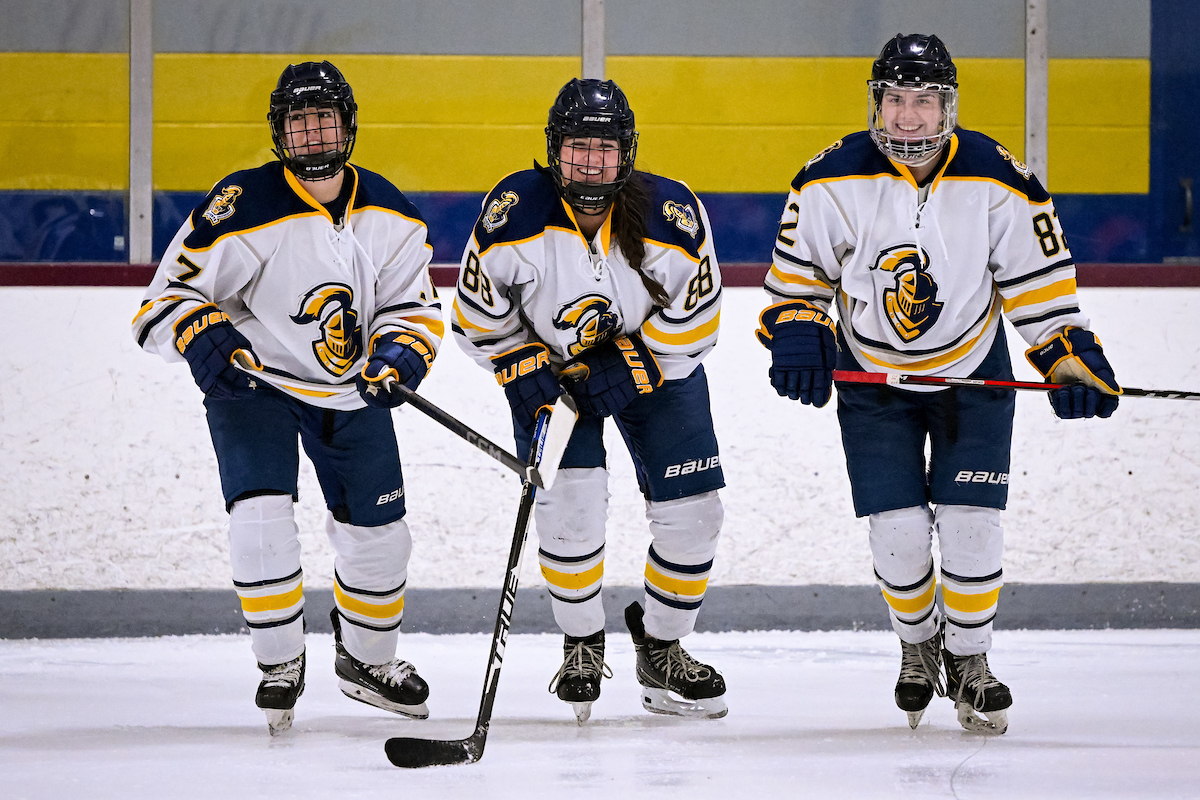 CHALLENGE
CHALLENGE

Celebrating 25 Years of Neumann Ice Hockey

In 1998, Neumann University made the bold step of launching an admittedly risky new endeavor, a men’s ice hockey team. For a small college with a modest budget, the new team required major investments in coaches, equipment, ice time rental, recruitment, and travel.
25 Years Later
Twenty-five years after a bold decision to start a hockey program, men’s and women’s NCAA ice hockey have become part of the university’s athletic DNA and a remarkable component in its history.
In 2009, the men’s team captured the Division III national championship, the only NCAA title ever won by any Knights team. That special season was part of a 12-year run from 2005-06 through 2016-17 during which the men’s squad compiled a record of 186-103-37 (a .627 winning percentage) and had 11 winning seasons.
The women’s team achieved success even faster. The golden age for women’s ice hockey was 2003-04 through 2010-11. During this eight-year period, the Knights compiled a record of 97-84-14 (a .533 winning percentage) and had only two losing seasons.
It wasn’t always that easy. In the first four years after the men began conference competition (2001-02 through 2004-05), their overall record was 10-83-4 and just 3-39-1 in conference. The women got off to a tough start, too, notching records of 1-20-0 and 6-10-2 before turning things around in their third year.
Chuck Sack, Neumann’s athletic director, arrived in 2003 and heard tales told by players about the early seasons for both teams. “There was joy for the chance to play the sport they love and gratitude for Neumann giving them that opportunity,” he confessed, “but from a hockey standpoint, it was brutal.”
In fact, the men’s on-ice woes earned Neumann its only reference on Sports Center, the flagship show on ESPN. According to Sack, “Back in the days when Dan Patrick and Keith Olbermann made that show sing, Sports Center included a segment called Did You Know?”
Early in 2002, the Neumann men made that segment after a February 8 loss to the Rochester Institute of Technology. The final score was 24-0. It is the second largest margin of victory in the history of Division III men’s ice hockey.
The National Championship
The men’s turnaround began with the hiring of Dennis Williams as head coach in 2004.
Sack calls Williams the person who built the framework for the national championship. “He taught us all what we needed to do. We got some kids from the Utica area because they wanted to play for him. We got some more kids out of Canada, and off we went. It was that core group of young men that Dennis brought here, with additions from Coach Phil Roy, who won the national championship.”
Watson, the former Flyer, agrees. “I loved Dennis. He was intense and no-nonsense, just the way you want it.”
Williams, who coached for three years, and Phil Roy, who stepped in for one, recruited the players whom Dominick Dawes '11 inherited when he took the reins of the team in 2008. It was his first head coaching job, but Sack was confident because of the success the rookie coach had as a player.
Dawes played for Norwich University from 2000 to 2004 and reached three Division III Frozen Fours with the Cadets. They won the national championship in 2003.
Recalling his first year at Neumann, Dawes admits that “Even now, it’s kind of a blur. It all happened so fast. My first official day at Neumann was October 1 and our first practice was October 6. I was 27 years old, and I think the seniors were all 24. They were men, a very mature group.”
Their togetherness as a team impressed Dawes. “They drove themselves, got better as the year went on, and were the classic definition of playing for each other – and with a chip on their shoulder. It was a heck of a run, a roller coaster.”
According to Sack, “That core group of kids from Dennis and Phil, mixed with Dominick’s leadership became a magic elixir. They did not want to take off the jersey. They didn’t care who got the credit. Those guys loved each other so much, they didn’t want to stop playing. It would be a great movie.”
A movie indeed. The Knights men’s ice hockey squad was a long shot to win the 2009 NCAA Division III National Championship. After winning the ECAC West title, they were ranked #12 entering the 16-team NCAA pool.
In retrospect, however, the team had assembled a collection of stars unparalleled in the history of Neumann hockey. Of the top seven career goal scorers in the Knights’ record book, five were on that team:
Career Goals: Men
- Michael Hedden '09 2005-09 96
- Neil Trimm '08 2004-08 61
- Jory Mullin '17 2013-17 52
- Matt Ward '10 2006-10 49 (tie)
- Kyle Casey '09 2005-09 49 (tie)
- Marlon Gardner '12 2008-12 48
-
Jesse Cole '09 2005-09 42
Dawes is humble about his contribution. “There was a very good team when I got there,” he admitted. “We had some pretty high-end talent, guys who went on to have pro careers – Mike Hedden, Lincoln Schrock and others. And Ross MacKinnon, our goalie, blacked out in the national semi-final and had the game of his life.”
The facts tell a tale that contradicts Dawes’ humility. He coached for seven years at Neumann and notched 107 wins (the coach in second place has 40). His teams won the ECAC West twice (2009, 2013), made the NCAA tournament twice, and played for the ECAC West title three other times (2011, 2012, 2015).
Women Make Their Mark
The trajectory of the women’s team mirrors that of the men: difficult early years, followed by an extended period of success, and recent struggles (one winning season in the last 12 years).
Matt Kennedy '01 '10, who was the goaltender for the first two hapless years of the men’s program, later became the most successful head coach of women’s ice hockey in Neumann history. He led the team for six years and finished with a 69-67-8 record, more wins than any other coach of the program.
Kennedy explains that he was injured during his second year in goal for the men (1999-00) and moved into an assistant coaching position with the women’s team. When head coach Michelle Billingsley left, he got the job, inheriting a team that had won only seven games in its first two seasons.
“We built on the foundation of the first two years and set out to recruit student-athletes who would embrace the mission of the university,” he recalled. Underplaying his own coaching acumen, he attributed the women’s turnaround to the vision of Dr. Mirenda, implemented by leaders like Chuck Sack and Len Schuler '84 '07 with support structures from Sr. Marguerite and Dr. Ed Peck, the team chaplain.
Kennedy was behind the bench during six of the eight years of stellar women’s play. He left for one year, lured away to an assistant coach gig at Quinnipiac, a Division I school, but he and his wife (both Neumann alumni) missed the area, and Sack arranged to upgrade the women’s head coach position to full time for him.
Of course, he had some outstanding players on his squads, young women whose achievements still stand in Neumann’s record books.
He remembers Jessica Schroeder '11 as one of the best, if not the best, in Neumann history with unparalleled speed and goal-scoring ability. “Everybody in the Northeast knew who she was.”
He dubs Lindsay Parsons '06 “the cornerstone of Neumann’s success and the catalyst for the start of a new era.” Parsons came from Ontario to join a growing program. She, Schroeder, and Carolyn Fauteux (“the embodiment of poise, purpose and passion,” said Kennedy) stood out as some of the best leaders during the most successful years of women’s hockey at Neumann.
The former coach also had high praise for Lauren (Voran) Oreskovich '06, a goalie from South Jersey, who had the ability to make big saves and Robyn Armstrong, “an unsung hero of our success who truly epitomized the ideal Division III student-athlete.”
Despite the extraordinary talent during these golden years, the women’s team never broke through to make the NCAAs. “The ECAC West was one of the strongest conferences in the country,” Kennedy explained. “You had perennial top ten teams in the country with Plattsburgh, Elmira and RIT.”
His favorite memory of his time as coach at Neumann is beating Utica College, 6-1, in the ECAC West playoffs in 2009 and going to the ECAC West final four. He calls it a defining moment for Neumann to finally get that first playoff win.
Sack, who has been Neumann’s athletic director for 20 years, recalled the heyday of women’s hockey at Neumann. “We attracted some incredible players like Lindsay Parsons, and we needed Canadian recruitment to be competitive with Plattsburgh and Elmira, which dominated women’s ice hockey for 20 years.”
Both schools, he noted, have on-campus rinks, and Plattsburgh sits just 30 minutes south of the Canadian border.
“Parsons made me appreciate ice hockey, the last sport where everyone has to work together,” said Sack. “Watching Lindsay play brought that to life for me.”
Parsons, who played from 2002 to 2006, is all over the Knights’ record books. She stands fourth in career goals and career points and second in career assists. Other legends in Neumann’s hockey annals are Jessica Schroeder (2007-11), Katelyn Brown (2017-22), Bek (Rebekah) Lucas (2014-18), and Nikki (Nicole) Blazenko (2007-11). Schroeder, Parsons, and Blazenko are from Ontario.
Career Points: Women
- Jessica Schroeder '11 2007-11 135
- Katelyn Brown '22 2017-22 117
- Bek (Rebekah) Lucas '18 2014-18 114
- Lindsay Parsons '06 2002-06 113
- Nikki (Nicole) Blazenko '11 2007-11 87
Top program goalies are Shannon Donnelly (2009-13) with 37 career wins and Helen Cooney (2016-20) with 26.
The Outlook
Sack believes that the proposed Ed Snider Ice Arena, will be the catalyst for another golden age of ice hockey for both the men’s and women’s programs.
“It will be a distinctive point of difference from many of our competitors. It would change our campus overnight, creating new revenue streams, affording opportunities to build a stronger following, and introducing the general population to ice skating and hockey. The arena will enhance our profile throughout the Mid-Atlantic region.”
The bold step taken in 1998 has borne fruit in many ways. The combined rosters of the women’s, men’s, and club teams hover at approximately 80 students every year. More importantly, the memories and friendships formed on and off the ice will last a lifetime.
